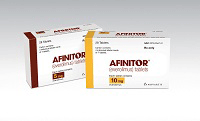
Kickback accusations have yet again been raised against Novartis, a company that four years ago promised to live by a new integrity code. Already embroiled with the Justice Department over accusations that it put together kickback schemes with pharmacies, a former exec now suggests she was fired for suggesting similar methods in the way Novartis ($NVS) planned to award a contract to wholesaler and health services company McKesson ($MCK).
The whistleblower lawsuit was filed in New Jersey by Min Amy Guo, the former executive director of Novartis' Health Economics and Outcomes Research Group, according to the Star-Ledger. Guo claims in her lawsuit that she was fired last year after suggesting the way Novartis proposed awarding a contract to McKesson for a study of cancer drug Afinitor "presented a conflict of interest and an appearance of kickbacks under the disguise of research."
Novartis denies Guo's charges, telling the Star-Ledger it "is committed to the highest standards of ethical and compliant business conduct in all aspects of its business and invests significant time and resources to ensure it does business in a responsible manner."
Guo's suit suggests otherwise. She said the project was proposed in 2012 and was going to take a month to complete, but cost $400,000, a figure she said was "too costly." And instead of the study of breast cancer drug Afinitor going through Guo's group as protocol for third-party studies called for, it was going to be overseen by the Oncology Scientific Operations-Managed Markets group, which Guo said is "focused on client interaction," not on research.
Guo said in her lawsuit that her position was "vindicated" when the executive director of clinical operations nixed the contract "for many of the same reasons." But she says Novartis retaliated against her, letting her go for raising objections.
Novartis has several times before been accused of using creative thinking to push its drugs. In 2010, it paid $422 million in fines and civil penalties to settle allegations that it offered kickbacks to doctors to increase prescriptions of its blood pressure drugs Diovan, Exforge and Tekturna. That settlement included a 5-year "corporate integrity" agreement which it is presumably still following.
Its current problems with the U.S. Attorney in New York stem from a whistleblower suit filed by former Novartis respiratory sales rep David Kester, who is pursuing separate claims against the company. Three related state lawsuits are also pending against the drugmaker. The government action says that between 2005 and 2013, Novartis provided discounts and rebates to up to 20 pharmacies to get them to switch kidney transplant patients to transplant drug Myfortic. It also claims that from 2007 to 2012, Novartis provided patient referrals and rebates to specialty pharmacy BioScrip ($BIOS) so that it would pressure patients to order refills of Exjade, which reduces excess iron in patients receiving blood transfusions.
BioScrip has paid a $15 million payment to settle the charges against it and admitted it pushed patients to get Exjade refills in return for more patient referrals and higher rebates. The lawsuit alleges that these programs violate federal anti-kickback statutes because the prescriptions that they generated were submitted to government-run Medicare and Medicaid insurance programs. Novartis has argued that the lawsuit fails to show that the company defrauded Medicare and Medicaid.
- read the Star-Ledger story